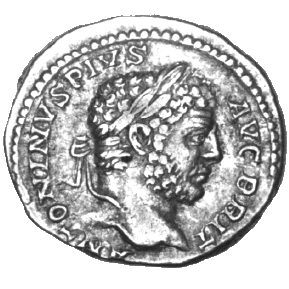 Contents --
Previous Article --
Next Article
Contents --
Previous Article --
Next Article
It seems that an often recurring pattern with the emperors of Rome was that a spoiled, worthless, cruel, and corrupt son of a strong, and capable emperor would inherit the throne. This happened in the case of Marcus Aurelius' son Commodus and again in the case of Caracalla. Despite the efforts of Septimius Severus to teach both his sons the manly arts of war and government, and his earnest deathbed plea for them to embrace each other in brotherly love and rule together in peace, both his sons grew to hate each other. This hatred would not be resolved until Caracalla murdered his brother Geta in their mother Julia Domna's arms.
Though both boys were given an excellent education, Caracalla grew up loving army life and the companionship of the soldiers. He reveled in physical conditioning and exercise, and often stated that he loved life in an army camp. Though the army was fond of both brothers, they were especially fond of Caracalla.
The rivalry and hatred between the boys started early. They would often compete in reckless chariot races through the streets of Rome. Each gathered around himself his own circle of friends, supporters, and admirers. After Geta’s murder, these friendships would prove fatal to his supporters.
During the reign of Septimius Severus, Plautian was praetorian prefect and the rivalry between Caracalla and this powerful minister became intense. Furthermore, Caracalla was forced to marry Plautian's daughter Plautilla, whom he grew to detest as much as he detested her father. Plautian was a thoroughly corrupt individual, but Severus could not see through him. Plautian had been a long time friend of Septimius Severus and came from the same part of North Africa as the emperor did. Plautian was arrogant and robbed many wealthy persons of their fortunes, having them condemned on trumped-up treason or other charges. His reign of terror, like the ones under Tiberius, Domitian, and Commodus, struck fear into the hearts of the Roman senators. Many people even thought that Plautian was trying to make himself as powerful as the emperor himself. Even the empress Julia Domna resented Plautian's power and intrusion into the imperial family circle.
Caracalla's chance for revenge eventually came. The emperor's brother condemned Plautian on his death bed, causing the emperor to start to wonder about his friend. Caracalla was able to bribe a centurion into telling Severus that Plautian had ordered him to kill the emperor and Caracalla. Caracalla even produced a forged letter with these instructions supposedly in Plautian's handwriting. Plautian was called into the emperor's presence to answer these charges, which he vehemently denied. While the proceedings were going on, Caracalla jumped up in a rage and drew the Praetorian Prefect's sword, slapping him in the face with the flat side of it. When Plautian shouted "I could have killed you!", Caracalla made ready to stab him. Severus is reported to have said "Don't you kill him", whereupon Caracalla ordered a guard to slay Plautian, putting an end to the man's powerful grip on the affairs of the empire.
In A. D. 212, Caracalla announced that he wished to make peace with his brother. they arranged to meet for reconciliation in their mother Julia's apartments. Perhaps she could lend her vast wisdom to patching up their quarrel. When the brothers met, they had barely exchanged greetings when several centurions leaped out of hiding and began to stab Geta. Geta ran to his mother's arms and begged her to save him. She did the best to shield him from the blows as she held him close, his life ebbing as his warm blood flowed out over her robes. Caracalla was giving orders to the centurions all the while, and ran from the room afterward, crying that his brother had tried to murder him. He convinced the Praetorian Guard that he had killed his brother in self defense. After professing his love and respect for the army, and promising them a large bonus, the Praetorians proclaimed Caracalla emperor.
Caracalla immediately set about having everyone executed who had been Geta’s friend and even had those who had only been seen in Geta's presence murdered. One historian of the period, Cassius Dio, states that twenty thousand souls died in this orgy of imperial cruelty. Caracalla could never ease the guilt he felt over what he had done. He would often have dreams in which his father, his brother, or some god would come out of the darkness to condemn him. He tried to rationalize his deed by having even more people murdered, telling himself that they were dangerous enemies of the state. Of course, he confiscated their estate as was the law with anyone condemned for treason.
It was his plan to murder his praetorian prefect Macrinus that was Caracalla’s undoing. Having been told by a soothsayer that he would be killed and Macrinus would take his place as emperor, Macrinus knew that Caracalla would make plans to have Macrinus killed after hearing the prophecy. Accordingly Macrinus found a soldier who hated Caracalla to do the actual killing. Evidently Caracalla had refused to promote the man, whose name was Martialis, to the rank of centurion.
It was the Spring of A. D. 217, and Caracalla was on his way to Carrhae to sacrifice to the moon god. Caracalla alighted down from his horse in order to relieve himself by the side of the road. Martialis approached on pretext of asking the emperor a question, whereupon he drew his dagger and mortally stabbed Caracalla
Go to next article on Emperor Macrinus
Go back to previous article on Emperor Geta